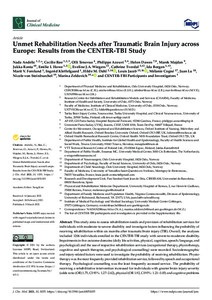Unmet Rehabilitation Needs after Traumatic Brain Injury across Europe: Results from the CENTER-TBI Study
Andelic Nada; Roe Cecilie; Tenovuo Olli; Azouvi Philippe; Dawes Helen; Majdan Marek; Ranta Jukka; Howe Emilie I; Wiegers Eveline JA; Tverdal Cathrine; Borgen Ida; Forslund Marit V; Kleffelgaard Ingerid; Dahl Hilde M; Jacob Louis; Cogne Mélanie; Lu Juan; von Steinbuechel Nicole; Zeldovich Marina; CENTER-TBI Participants
Unmet Rehabilitation Needs after Traumatic Brain Injury across Europe: Results from the CENTER-TBI Study
Andelic Nada
Roe Cecilie
Tenovuo Olli
Azouvi Philippe
Dawes Helen
Majdan Marek
Ranta Jukka
Howe Emilie I
Wiegers Eveline JA
Tverdal Cathrine
Borgen Ida
Forslund Marit V
Kleffelgaard Ingerid
Dahl Hilde M
Jacob Louis
Cogne Mélanie
Lu Juan
von Steinbuechel Nicole
Zeldovich Marina
CENTER-TBI Participants
MDPI
Julkaisun pysyvä osoite on:
https://urn.fi/URN:NBN:fi-fe2021093048899
https://urn.fi/URN:NBN:fi-fe2021093048899
Tiivistelmä
This study aims to assess rehabilitation needs and provision of rehabilitation services for individuals with moderate-to-severe disability and investigate factors influencing the probability of receiving rehabilitation within six months after traumatic brain injury (TBI). Overall, the analyses included 1206 individuals enrolled in the CENTER-TBI study with severe-to-moderate disability. Impairments in five outcome domains (daily life activities, physical, cognition, speech/language, and psychological) and the use of respective rehabilitation services (occupational therapy, physiotherapy, cognitive and speech therapies, and psychological counselling) were recorded. Sociodemographic and injury-related factors were used to investigate the probability of receiving rehabilitation. Physiotherapy was the most frequently provided rehabilitation service, followed by speech and occupational therapy. Psychological counselling was the least frequently accessed service. The probability of receiving a rehabilitative intervention increased for individuals with greater brain injury severity (odds ratio (OR) 1.75, CI 95%: 1.27-2.42), physical (OR 1.92, CI 95%: 1.21-3.05) and cognitive problems (OR 4.00, CI 95%: 2.34-6.83) but decreased for individuals reporting psychological problems (OR 0.57, CI 95%: 1.21-3.05). The study results emphasize the need for more extensive prescription of rehabilitation services for individuals with disability. Moreover, targeted rehabilitation programs, which aim to improve outcomes, should specifically involve psychological services to meet the needs of individuals recovering from TBI.
Kokoelmat
- Rinnakkaistallenteet [29337]
